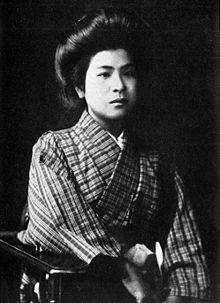Ito Noe
| Itō Noe | |
|---|---|
 |
|
| Born |
January 21, 1895 Fukuoka, Japan |
| Died | September 16, 1923 (aged 28) Tokyo, Japan |
| Spouse(s) | Jun Tsuji |
Noe Itō (伊藤 野枝 Itō Noe, January 21, 1895 – September 16, 1923) was a Japanese anarchist, social critic, author and feminist.
Itō was born on the island of Kyushu near Fukuoka, Japan on January 21, 1895. At 14 she went to work for the post office; the next year she moved to Tokyo to enter the Ueno Girls' High School.
In the summer of her fifth year at Ueno, Ito's uncle arranged for her to marry a man named Fukutaro; she agreed to the marriage because Fukutaro had just returned from America, where she hoped to go. She confided in her sister that when they reached America she would leave him. That never happened, they remained in Japan, and Itō's displeasure deepened when her husband did not support her educational interests—which had been part of the wedding arrangement.
While attending Ueno, Itō formed a friendship with her English teacher, Jun Tsuji. He had been her confidante during her marriage, and he let her stay with him when she was to be sent back home with her husband, which would have disrupted her education. With his support she ended her marriage and continued her education.
In March 1912, Itō graduated from Ueno Girls' High School. She joined the Society (青鞜社 Seitō-sha), producer of the feminist arts-and-culture magazine (青鞜) in 1915, contributing until 1916. In her last year as Editor-in-Chief, she practiced an inclusive attitude towards content; she "opened the pages to extended discussions of abortion, prostitution, free love and motherhood".
Under Itō's editorship, Seitō became a more radical journal that led the government to ban five issues of Seitō as threatening the kokutai. The February 1914 edition of Seitō was banned by the censors because of a short story Itō had published in the journal titled Shuppon ("Flight") about an young woman who escapes from an arranged marriage and is then betrayed by her lover who promised to escape with her from Japan. The June 1915 edition of Seitō was banned for an article calling for abortion to be legalized in Japan. Three other editions of Seitō were banned because of an erotic short story where a woman happily remembers having sex the previous night; another edition for a short story dealing with the break-up of an arranged marriage, and another edition for an article titled "To The Women of the World" calling for women to marry for love. Ito had Seitō become more concerned with social issues that it had been before, and in 1914-16, she engaged in a debate on the pages of Seitō with another feminist, Yamakawa Kikue, about whether prostitution should be legalized or not. Ito argued for the legalization of prostitution for the same reasons that she favored the legalization of abortion, namely that she believed that women's bodies belonged only to them, and that the state had no business telling a woman what she may or may not do with her body. Furthermore, Itō argued that the Japanese social system did not offer many economic opportunities to women and that most Japanese prostitutes were destitute women who turned to selling sex in order to survive, which led her to the conclusion that these women should not be punished for merely seeking a means to live. Itō wrote social criticism and novels, and translated writings of Emma Goldman (The Tragedy of Woman's Emancipation, etc.). In February 1916, Seitō published its last edition due to a lack of funds, as the government had prevented distributors from carrying the magazine.
...
Wikipedia
